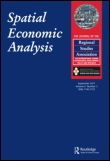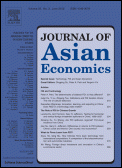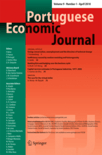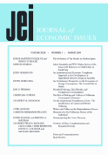
Economic Computation and Economic Cybernetics Studies and Research
Scope & Guideline
Empowering Economic Insights through Computational Excellence.
Introduction
Aims and Scopes
- Economic Modeling and Simulation:
The journal emphasizes the development and application of mathematical models and simulations to analyze economic phenomena, evaluate policies, and forecast trends. - Decision-Making Frameworks:
It explores various decision-making methodologies, including multi-criteria decision-making (MCDM), optimization techniques, and game theory, to address complex economic challenges. - Digital Transformation and Technology Impact:
Research on the implications of digitalization, artificial intelligence, and emerging technologies on economic performance and organizational behavior is a core focus area. - Sustainability and Economic Development:
The journal promotes studies that assess the relationship between economic growth and sustainability, emphasizing the importance of environmental considerations in economic decision-making. - Empirical Economic Analysis:
It publishes empirical studies that utilize advanced econometric and statistical techniques to investigate economic relationships and validate theoretical models. - Regional and Sectoral Economic Studies:
The journal covers research that analyzes economic dynamics at regional and sectoral levels, providing insights into specific economic contexts and challenges.
Trending and Emerging
- Artificial Intelligence in Economics:
There is a notable increase in research examining the application of artificial intelligence and machine learning techniques in economic modeling, forecasting, and decision-making processes. - Sustainability and Green Economics:
Studies focusing on sustainable economic practices, the circular economy, and the integration of environmental considerations into economic frameworks are becoming increasingly prominent. - Impact of Digitalization on Economic Systems:
Research exploring the effects of digital transformation on economic performance, organizational behavior, and market dynamics is on the rise, reflecting the growing importance of technology in economics. - Risk Management and Economic Resilience:
Emerging themes related to risk management, particularly in the context of global challenges such as pandemics and climate change, are gaining attention as researchers seek to understand and mitigate economic vulnerabilities. - Behavioral Economics and Decision-Making:
An increasing focus on behavioral economics, especially studies that examine decision-making processes under uncertainty and the influence of psychological factors, is becoming more prevalent in recent publications.
Declining or Waning
- Traditional Economic Theories:
There seems to be a decline in papers focused solely on classical economic theories without the integration of computational or empirical methodologies, possibly as the field shifts towards more data-driven approaches. - Static Economic Models:
Research employing static models that do not account for dynamic changes in economic systems appears to be less prevalent, reflecting a broader trend towards dynamic modeling that captures the complexities of economic behavior. - Generalized Economic Policies:
Studies focusing on generalized economic policies without empirical backing or specific case studies are becoming less common, as there is a growing preference for tailored analyses supported by data.
Similar Journals

Upravlenets-The Manager
Unlocking the Dynamics of Effective LeadershipUpravlenets-The Manager, published by URAL STATE UNIV ECONOMICS, is a distinguished open-access journal that has been contributing to the body of knowledge in management and organizational studies since its inception in 2013. With an ISSN of 2218-5003, this journal is committed to promoting research that examines innovative managerial practices, strategic decision-making, and the dynamics of organizational behavior in an increasingly complex global marketplace. Housed in Yekaterinburg, Russia, the journal aims to provide a platform for scholars, practitioners, and students alike to disseminate and explore findings that can lead to impactful managerial solutions and improvements in various organizational contexts. Open-access format ensures that research published within is readily accessible to a global audience, fostering collaborative engagement and knowledge-sharing across borders. By contributing to the advancement of management practices, Upravlenets-The Manager remains an essential resource for anyone keen to engage with current trends and research in management.

Equilibrium-Quarterly Journal of Economics and Economic Policy
Connecting Scholars to Shape Economic FuturesEquilibrium-Quarterly Journal of Economics and Economic Policy is a leading open-access journal, published by the Institute of Economic Research in Poland. Since its inception in 2011, this journal has served as a vital platform for disseminating innovative research and scholarly discourse in Economics and Economic Policy. The journal maintains a high impact within the academic community, currently holding a Q2 ranking in Economics and Econometrics and a Q1 ranking in the miscellaneous category of Economics, Econometrics, and Finance as of 2023. With an impressive Scopus ranking, it sits at #8 out of 242 in its field, demonstrating its commitment to quality and relevance in contemporary economic research. The journal welcomes contributions that advance theoretical and empirical discussions, encompassing a broad spectrum of topics in economics, thereby appealing to researchers, professionals, and students alike. Through its open access model, Equilibrium ensures widespread availability of knowledge and fosters collaboration across disciplines within the global economic community.

Spatial Economic Analysis
Navigating the Complexities of Spatial EconomicsSpatial Economic Analysis, published by Routledge Journals, Taylor & Francis Ltd, stands at the forefront of interdisciplinary research bridging economics, geography, and environmental science. With a notable impact factor reflected in its prestigious Q1 quartile rankings across key categories such as Earth and Planetary Sciences, Economics, Econometrics and Finance, and Geography, this journal is pivotal for scholars seeking to understand the intricate dynamics of spatial phenomena and their economic implications. Its comprehensive scope and rigorous peer-review process ensure that only high-quality research is disseminated, fostering innovative solutions to pressing global challenges. As of 2024, and since its inception in 2006, Spatial Economic Analysis continues to thrive as a vital platform for researchers, professionals, and students alike, facilitating access to cutting-edge studies that shape the future of spatial economics and policy.

Quantitative Finance and Economics
Championing Open Access to Vital Economic InsightsQuantitative Finance and Economics, published by the American Institute of Mathematical Sciences (AIMS), is a pioneering open-access journal committed to advancing the fields of finance and economics. Established to disseminate high-quality research, this journal has been an open-access platform since 2017, promoting wider accessibility to vital academic findings. It serves as a crucial resource for researchers and professionals alike, offering valuable insights through rigorous studies in quantitative methods that influence financial and economic decision-making. Although current Scopus rankings indicate emerging challenges, with a rank in the lower percentiles across various categories, Quantitative Finance and Economics strives to gain recognition by bridging theoretical frameworks with practical applications. The journal invites contributions that explore innovative quantitative techniques and their implications in contemporary economic scenarios, thus underscoring its role in shaping discourse and research in this critical sector.

ECONOMETRICA
Leading the way in cutting-edge economic research.ECONOMETRICA, published by Wiley, is a leading journal in the field of economics and econometrics, renowned for its rigorous and cutting-edge research contributions. With an ISSN of 0012-9682 and an E-ISSN of 1468-0262, this esteemed journal holds a prestigious position in the academic landscape, classified in the top quartile (Q1) for both Economics and Econometrics as of 2023, and ranked 42 out of 716 in its field, placing it in the 94th percentile according to Scopus metrics. The journal's scope encompasses a diverse range of topics aimed at advancing economic theory and its practical applications, making it an essential resource for scholars, practitioners, and students alike. Although it operates under a subscription model, the depth and quality of research published in ECONOMETRICA underscore its significance as a cornerstone for intellectual discourse and innovation within the field. Based in the United Kingdom, at 111 River St, Hoboken, NJ 07030-5774, ECONOMETRICA continues to attract high-caliber contributions that shape the future of econometric research.

Vestnik Sankt-Peterburgskogo Universiteta-Ekonomika-St Petersburg University Journal of Economic Studies
Illuminating Economic Pathways for Scholars and PractitionersVestnik Sankt-Peterburgskogo Universiteta-Ekonomika-St Petersburg University Journal of Economic Studies, published by ST PETERSBURG UNIV PRESS, is a prominent scholarly journal in the field of economics, econometrics, and finance. With an ISSN of 1026-356X and an E-ISSN of 2542-226X, this journal serves as a vital platform for researchers and professionals looking to explore critical economic theories, quantitative methodologies, and pragmatic approaches to real-world financial issues. As a recognized publication within the Q3 category of Economics in the 2023 rankings, it ranks 159 out of 288 journals, holding a percentile of 44th in the Scopus database. The journal covers a wide array of topics relevant to the field, from economic policy to financial market analysis, enhancing the body of knowledge in the economic landscape. Although an open-access option is not available, the journal’s commitment to advancing economic research from 2019 to 2024 solidifies its importance in shaping academic discourse and fostering interdisciplinary collaboration. This makes it an essential resource for students, educators, and practitioners who seek to remain at the forefront of economic studies.

Journal of Asian Economics
Exploring the Dynamics of Asian EconomiesThe Journal of Asian Economics, published by Elsevier, serves as a pivotal platform for scholars and practitioners engaged in the comprehensive study of economic issues within Asia. With an ISSN of 1049-0078 and an E-ISSN of 1873-7927, this esteemed journal encompasses a wide array of topics in its scope, ranging from macroeconomic policy analysis to the intricacies of financial markets in the Asian context. Ranking in the Q2 category for both Economics and Econometrics and Finance, according to the 2023 metrics, it is positioned among the top-tier journals, currently holding a significant place at the 73rd percentile in Finance and 72nd percentile in Economics. This journal not only caters to academic researchers looking to publish their findings but also serves as an essential resource for professionals and students seeking to deepen their understanding of the dynamic economic landscape in Asia. By bridging empirical research and practical insights, the Journal of Asian Economics plays a crucial role in advancing knowledge and encouraging discourse in the field.

Portuguese Economic Journal
Exploring the Frontiers of Economics and FinanceWelcome to the Portuguese Economic Journal, a renowned publication in the field of economics, published by SPRINGER HEIDELBERG. With an ISSN of 1617-982X and flexible access options, this journal serves as a pivotal platform for both established and emerging researchers. Spanning a broad range of topics within Economics, Econometrics, and Finance, the journal has successfully converged from 2005 to 2024, positioning itself in Q3 for Economics and Econometrics and Q2 in Economics, Econometrics and Finance (miscellaneous) as per the latest 2023 category quartiles. It is ranked 68th out of 288 in the Scopus list for General Economics, highlighting its significant place in the academic landscape. Based in Germany, the journal fosters a global dialogue on economic issues, making it an invaluable resource for researchers, professionals, and students seeking to engage with contemporary economic discussions. Join our community as we explore innovative economic theories, data-driven analyses, and practical applications to contribute to the advancement of the field.

JOURNAL OF ECONOMIC ISSUES
Empowering research that drives the economics field forward.JOURNAL OF ECONOMIC ISSUES, published by Routledge Journals, Taylor & Francis Ltd, is a vital resource in the field of economics and related social sciences. With its ISSN 0021-3624 and E-ISSN 1946-326X, this esteemed journal brings a critical focus on contemporary economic discussions, analyses, and research findings since its inception in 1982. The journal has been consistently recognized for its scholarly contributions, noted for a 2023 categorization of Q2 in Business, Management, and Accounting (miscellaneous) and Q3 in Economics and Econometrics, highlighting its relevance within these disciplines. Although not an open-access journal, the value of its exclusive content is immense for researchers, professionals, and students seeking in-depth knowledge and insights on economic issues. The editorial board is dedicated to advancing understanding in various economic arenas, inviting contributions that challenge conventional wisdom and foster deeper inquiries into economic phenomena. The journal's location in the United Kingdom, at 2-4 Park Square, Milton Park, Abingdon, reflects its commitment to international discourse in economic studies. As we navigate an increasingly complex global economy, the JOURNAL OF ECONOMIC ISSUES remains an essential platform for sharing innovative ideas and research that drive the economics field forward.

Ekonomika i Matematiceskie Metody-Economics and Mathematical Methods
Catalyzing Academic Discourse in Economic SciencesEkonomika i Matematiceskie Metody - Economics and Mathematical Methods is a distinguished journal published by the esteemed Russian Academy of Sciences and the State Academy of Humanities (GAUGN). It serves as a vital resource in the interdisciplinary field of economics and mathematical applications, focusing on advanced theories, methodologies, and quantitative techniques that drive economic research and practice. With an ISSN of 0424-7388, this journal is geared towards researchers, professionals, and students who seek to contribute to the evolving landscape of economic theory and mathematics. Although the journal does not currently offer open access, it remains committed to fostering rigorous academic discourse. Through its insightful articles, Ekonomika i Matematiceskie Metody plays a crucial role in disseminating influential concepts and methodologies, making it an essential publication within the realm of economic sciences.